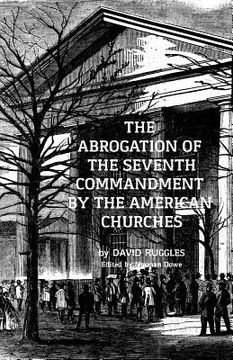The Abrogation of the Seventh Commandment by the American Churches: The Acceptance of Adultery by the Pre-Civil War Church (en Inglés)
Reseña del libro "The Abrogation of the Seventh Commandment by the American Churches: The Acceptance of Adultery by the Pre-Civil War Church (en Inglés)"
David Ruggles was born Lyme, Connecticut to David and Nancy Ruggles in 1810. His parents were both free blacks. The family moved to Norwich, where his father was a blacksmith and woodcutter and his mother a caterer. They were devout Methodists. David was the oldest of eight children. He was educated at Sabbath Schools, and was so bright that neighbors paid for a tutor from Yale to teach him Latin. In 1826, sixteen year old Ruggles moved to New York City. There he opened a a grocery store. Initially, he sold liquor but latter embraced the temperance movement and stopped. Becoming involved in the anti-slavery cause, he was a sales agent for and contributor to The Liberator and The Emancipator, abolitionist newspapers. After closing the grocery, Ruggles opened the first African American-owned bookstore in the United States. He edited a New York journal called The Mirror of Liberty, and also published a pamphlet called The Extinguisher. He also published "The Abrogation of the Seventh Commandment" in 1835, an appeal to northern women to confront husbands who kept enslaved black women as mistresses. Ruggles was secretary of the New York Committee of Vigilance, a radical biracial organization to aid fugitive slaves, oppose slavery, and inform enslaved workers in New York about their rights in the state. New York had abolished slavery and stated that slaves voluntarily brought to the state by a master would automatically gain freedom after nine months of residence. On occasion, Ruggles went to private homes after learning that enslaved blacks were hidden there, to tell workers that they were free. In October 1838, Ruggles assisted Frederick Douglass on his journey to freedom, and reunited Douglass with his fiancé Anna Murray. Rev. James Pennington, a run away slave, married Murray and Douglass in Ruggles' home shortly thereafter. Douglass' autobiography 'Narrative of the Life of Frederick Douglass' explains "I had been in New York but a few days, when Mr. Ruggles sought me out, and very kindly took me to his boarding-house at the corner of Church and Lespenard Streets. Mr. Ruggles was then very deeply engaged in the memorable Darg case, as well as attending to a number of other fugitive slaves, devising ways and means for their successful escape; and, though watched and hemmed in on almost every side, he seemed to be more than a match for his enemies." Ruggles was especially active against "kidnappers," bounty hunters who made a living by capturing escaped slaves. With demand high for slaves in the Deep South, there was also risk from men who kidnapped free blacks and sold them into slavery, as was done to Solomon Northup of Saratoga Springs, New York in 1841. With the Vigilance committee, Ruggles fought for fugitive slaves to have the right to jury trials and helped arrange legal assistance for them. His activism earned him many enemies. Ruggles was physically assaulted and his business was destroyed through arson. He quickly reopened his library and bookshop. There were two known attempts to kidnap him and sell him into slavery in the South.[6] His enemies included fellow abolitionists who disagreed with his tactics. He was criticized for his role in the well-publicized Darg case of 1838 involving a Virginia slaveholder named John P. Darg and his slave, Thomas Hughes. Ruggles suffered from ill health, which intensified following the Darg case. In 1841, his father died, and Ruggles was ailing and almost blind. In 1842, Lydia Maria Child, a fellow abolitionist and friend, arranged for him to join a radical utopian commune called the Northampton Association of Education and Industry, in the present-day village of Florence, Massachusetts. Ruggles died in Florence in 1849, due to a bowel infection.

